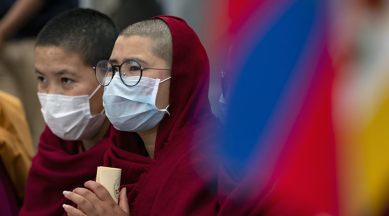Harikishan Sharma, Senior Assistant Editor at The Indian Express' National Bureau, specializes in reporting on governance, policy, and data. He covers the Prime Minister’s Office and pivotal central ministries, such as the Ministry of Agriculture & Farmers’ Welfare, Ministry of Cooperation, Ministry of Consumer Affairs, Food and Public Distribution, Ministry of Rural Development, and Ministry of Jal Shakti. His work primarily revolves around reporting and policy analysis. In addition to this, he authors a weekly column titled "STATE-ISTICALLY SPEAKING," which is prominently featured on The Indian Express website. In this column, he immerses readers in narratives deeply rooted in socio-economic, political, and electoral data, providing insightful perspectives on these critical aspects of governance and society. ... Read More
Govt estimates: In next 2 months, need 27 million N95 masks, 50000 ventilators
According to sources, this was conveyed to industry representatives during a meeting on April 3 of the empowered group of officials on “coordinating with private sector, NGOs and international organisations”, which is headed by the NITI Aayog CEO Amitabh Kant.

Estimating a spike in demand for personal protective equipment and diagnostic kits in the fight against COVID-19, the central government has calculated that the country will require about 27 million N95 masks, 15 million PPEs, 1.6 million diagnostic kits, and 50,000 ventilators in next two months, The Indian Express has learnt.
According to sources, this was conveyed to industry representatives during a meeting on April 3 of the empowered group of officials on “coordinating with private sector, NGOs and international organisations”, which is headed by the NITI Aayog CEO Amitabh Kant.
monthly limit of free stories.
with an Express account.
“Demand for 27 million N95 masks, 1.6 million testing kits and 15 million PPEs by June 2020 is estimated and actions are being taken to procure them,” sources quoted an official as saying during the meeting that was also attended by FICCI representatives.
“The demand of ventilators has been estimated to be 50,000 by June 2020. Out of these, 16,000 are already available and orders has been placed for 34,000 ventilators. To facilitate procurement of ventilators and other PPEs from abroad, MEA (Ministry of External Affairs) has been taken on board,” the official said.
Sources said the official’s comments came in response to industry representatives who wanted clarity on “the projected demand and supply environment of PPEs” and other protective gear for the next 6-12 months. The information, they said, is critical for the industry to plan and make investments.
Don’t miss from Explained: Clusters lead to a surge in spread but could help contain it too
The empowered group is one of the 11 tasked with different aspects of coordinating the response to the coronavirus pandemic. Apart from Kant, it has six other members: Principal Scientific Advisor Dr Vijayaraghavan, NDMA member Kamal Kishore, CBIC member Sandeep Mohan Bhatnagar, Additional Secretary (Home) Anil Malik, Joint Secretary in PMO Gopal Baglay, and Deputy Secretary, Cabinet Secretariat, Tina Soni.
The industry representatives at the meeting included: FICCI president Dr Sangita Reddy; Uday Shankar, Senior Vice President, FICCI; Mehta, Vice President, FICCI, Ashwani Channan, Honey Well; and Harsh Mahajan, Mahajan Imaging.
The government is battling to ramp up supply of critical medical equipment, and has restricted or prohibited their export in last few weeks. The latest move was a restriction on export of testing kits Saturday.
Don’t miss from Explained: Where does virus go from here?
On March 24, the government had prohibited the export of “all ventilators including any artificial respiratory apparatus or oxygen therapy apparatus or any other breathing appliance/device and sanitisers”.
Similarly, the export of surgical masks, textile raw material for masks, and coveralls, was banned with effect from March 19. It had banned the export of PPEs and masks on January 31, a day after Kerala reported the country’s first case of coronavirus.
Here’s a quick Coronavirus guide from Express Explained to keep you updated: What can cause a COVID-19 patient to relapse after recovery? | COVID-19 lockdown has cleaned up the air, but this may not be good news. Here’s why | Can alternative medicine work against the coronavirus? | A five-minute test for COVID-19 has been readied, India may get it too | How India is building up defence during lockdown | Why only a fraction of those with coronavirus suffer acutely | How do healthcare workers protect themselves from getting infected? | What does it take to set up isolation wards?